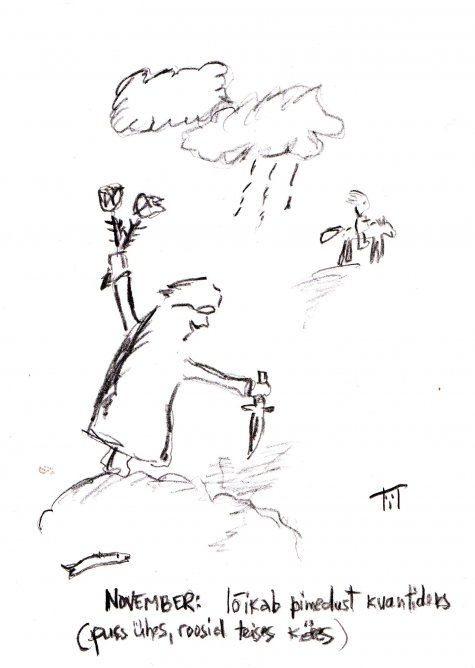The backyard potterer's year. November
Illustration and story: Tiit Kändler
Translation: Liis
November: slicing darkness into quanta (knife in one hand, roses in the other)
November is a rosy month for the backyard potterer. It starts with the roses, those eternally stubborn flowers, still trying to force some flower buds to open. Just as if they were set on throwing themselves under a train thundering past, or into the arms of the soon to arrive cold wave.
Interesting – why does one say wave of cold, the backyard potterer ponders. The rest of the world around and inside us is built up from discrete entities. But just as light is a wave from one aspect and a little packet or quantum from another, so then probably cold too is both a wave and a particle. Yes, and November will undoubtedly prove this discovery that will cause a fundamental revolution in science. Cold really comes in packets. Cold is quantified, quite as energy and light, the backyard potterer’s mind exults.
The clouds before sunset at the seashore in the first days of November are a landscape of their own. Red, orange against the blue-black backdrop of the sky, like giant cosmic gas clouds. Likely that it is from them as models that the gas clouds in the Hubble space telescope recordings have their mindblowing colours. In such clouds surely a life of its own teems, there is surely a backyard, and a backyard potterer, the earthly backyard potterer thinks; he has climbed on to a sand dune to get closer to the clouds. And then, just before the purple of the clouds goes out and changes into a dusky November night, a horse walks soundlessly across a distant sand dune, with a maiden on its back. Soundlessly, soundlessly, illuminated by the light quanta. Just as in a René Magritte painting – and who said that Magritte wasn’t a realist.
And then November goes on, and dusk arrives even before there has been dawn. The darkness is there in quantities, it can be cut into quanta with a knife even. The darkness sucks up all thoughts like a sponge, so that our backyard potterer finds no other ideas than to start cutting up wood. But why the hurry – when the cold quanta haven’t arrived yet? Birch sounds like a bell under the axe, ash crackles, the pine yields with some playful reluctance, the spruce grumbles bad-humouredly. Only the rowan and the bird cherry persist and need a wedge and suitable hammer instead of the axe. The wedge – oh yes, the first technical device that man invented and put to use. And it may have been just in November that he made the first stone axe, then to go on to the next innovative idea: that now making fire should be learnt too.
The backyard potterer slips along the little stream. Now in November the bottom can be seen again; in summer with the lazily moving water it was full of debris and caddisfly larvae. Somewhere the waters have been released, even though there hasn’t been rain. And the streamlet shows its delightful sand bottom, that isn’t the vulgar common sand colour but brownish red, about as Rembrandt’s red that the painter mixed for his paintings in the third-floor studio in his Amsterdam house.
Reddish brown is precisely the colour of November’s beginning. The colour shines from the pine needles that have dropped on the sand, the heath has that colour. Yes, there is much to see on the heath. Now it can astonish with its colours that were covered in spring and summer by flowers, leaves and all kinds of beings. The reddish heather that has flowered over, the dark red of the stunted pine – and the shining and calming green of the moss. There is nothing like it. Although the backyard potterer thinks that he knows that it is actually lichen he doesn’t care. People have the right not to know even what they know, and so pleasant things should be have pleasant names, not ugly ones. Moss, moss, moss - green, green, green. Like a little colour poem.
Rain is dribbling, in November you don’t really know if it from above or beneath. The drizzle has melded the sea with the not-sea. The gulls have disappeared into it. Only some solitary crows circle the sky and sing their croaking song. Craw, craw – and the willow pussies have been pulled out from their cocoons as if by the nose. Behind the willow the snowberry bush is waiting in front of the boulder, so that the backyard potterer can let loose some little bangs with its snow-white berries.
And so the snow is here. The first snow however doesn’t tell even the cleverest sign reader whether there will be more of it or if it will just disappear somewhere underground.
But it will come, it will surely come, the first snow won’t stay hanging between heaven and earth. It can’t be, it reaches towards heaven and all its family comes down from there, with all the friends and neighbours to boot.
The spider, and even the fly, that could be admired yesterday, have disappeared somewhere. The marigold that flowered courageously even yesterday has gone under the first little snow portion. But the yard keeps up, even if ten times as much snow would come down. The yard has become transparent now, snowy. The backyard potterer has no more worries about his plants. The roses didn’t get covered of course – but where do you find a manor in these days, to drag out a load of spruce branches tied up with a rope from. But maybe it doesn’t matter, the first snow that just falls and falls might do instead. Or maybe it doesn’t. Who lives will see. The backyard potterer is inventive, he has a reason for his laziness. When he covered the roses against the cold last winter only three of the most hardy bushes survived in spring. And even scientists have begun to talk about the genetic inheritance of traits acquired in life, quite as father Mitshurin and son Lysenko did in their times. So the rose should get this into its head – or its buds – and at last get winter hardy.
The backyard potterer has glorious days. He can shovel snow, and shape his yard as he likes without trouble. The snow walls don’t need watering, snowdrifts need no weeding and snow heaps don’t have to be sprayed agianst diseases.
Oh no – suddenly he remembers that the bird feeder hasn’t been set up and provided with food. Well, this gets done too. One day, two – nobody appears. But then, one morning when the sun rises as it does in November from God knows what direction – if there are any directions left indeed – the first nuthatch is there. And then the second. And then a great tit, and another. How ever did they know, how did they guess, when they haven’t Internet nor even mail by the Eesti Post, the backyard potterer wonders. If one could find out for oneself too where dinner tables are set with free food ... And he goes to put the karask, the barley scone, into the oven. As a homage to the rosy, the snow-rose rosy yard.









